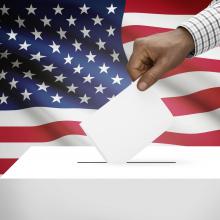VRA

Dr. Deborah Turner of the League of Women Voters (LWV), Rabbi Jonah Pesner of Religious Action Network, Virginia Kase Solomón of LWV, Rev. Melvin Wilson of Saint Matthew AME Church, and Ben Jealous of People for the American Way lead a civil disobedience action during a voting rights rally at the White House. LWV, People for the American Way, Black Voters Matter, and many other organizations hosted the rally to pressure Congress and President Biden to protect voting rights after many states passed laws to make voting more difficult for minorities. Photo by Allison Bailey/NurPhoto via Reuters.
The House of Representatives passed HR 4, known as the John Lewis Voting Rights Advacement Act, 219-212, which faith leaders and other voting rights advocates believe is a crucial step in voter protection.
“Tireless hours by members of Congress and civil rights leaders have brought the issue of federally mandated voter suppression to the forefront of conversations around American democracy,” Rev. Al Sharpton said in a news release through March On For Voting Rights. “This is only the start of the fight to move farther and farther away from the Jim Crow Era.”

Image via Niyazz/Shutterstock
Today is the 50th anniversary of the landmark Voting Rights Act, passed Aug, 6, 1965. The act, signed into law by President Lyndon B. Johnson, created key provisions to prevent racial discrimination in voting laws.
The Voting Rights Act has been called "the single most effective piece of civil rights legislation ever passed by Congress."
Today's anniversary is a bittersweet commemoration. In 2013, the Supreme Court struck down Section 4, which had required Alabama, Alaska, Arizona, Georgia, Louisiana, Mississippi, South Carolina, Texas, and Virginia to seek federal approval before imposing changes to voter laws.
On Tuesday, the Supreme Court struck down part of the Voting Rights Act that was enacted in 1965 to root out racial discrimination in voting. The specific section of the Act that was stricken — Section 4 — set forth a formula for determining which jurisdictions need federal clearance before making even minor changes to voting procedures. The impact of striking Section 4 is that the most important part of the Act, Section 5, is now rendered useless. Section 5 provides that states, cities, and counties with a history of racial discrimination in voting must “pre-clear” changes to voting procedures with the Department of Justice or a special court in Washington, D.C. Without the formula in Section 4 to determine which states, cities, and counties the preclearance should apply to, the preemptive protection provided by Section 5 no longer exists, and any future challenges to changes in voting procedure must happen after such changes are already in effect.
The majority of the Court felt that racial minorities do not continue to face discriminatory voting practices, and that the preclearance requirement was based on 40-year-old facts that had no logical bearing on present day. Chief Justice Roberts, Jr., wrote:
“Our country has changed. While any racial discrimination in voting is too much, Congress must ensure that the legislation it passes to remedy that problem speaks to current conditions.”
The practical application of Tuesday's decision is that states will be able to enact potentially discriminatory laws that previously had been blocked. This was made immediately apparent in Texas, which announced after the ruling that voter identification laws would go into effect immediately.
